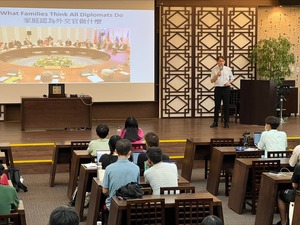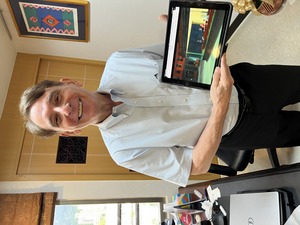The Island Less Traveled: Interviewing Professor William Stanton


【Article by Office of International Cooperation】
“I went with my heart, rather than what my parents wanted,” said Professor Stanton, the American ambassador to Taiwan from 2009 to 2012, when talking about how he chose English as his major when he was 17.
“My parents’ dream was that I would become a doctor. In their minds, to be a medical doctor was the be-all and end-all.” Be that as it may, after two years of doing science honors, the 17-year-old Stanton, having already won writing awards and with a passion for the poetry of T.S. Eliot and the love poems of John Donne, decided that more than anything else, literature was what he loved the most.
When Stanton took on the offer of a full scholarship to study English in Fordham University, his father decided that he was a “total loser.” Stanton recalled this with a slightly resigned smile on his face, knowing very well that, in the end, he still managed to become the high achiever his father had always wanted him to be, as an ambassador, if not as a medical doctor.
So, how did someone with a PhD degree in English Literature, who wrote a dissertation on Bernard Mandeville’s “the Fable of the Bees” start working in the U.S. Foreign Service?
“One day, sitting in a coffee shop in North Carolina, Chapel Hill”, reminisced Stanton, “I saw this little ad, saying the Foreign Service exam would be given at such and such a time and place, so I wrote a letter to Washington.”
The fact that there weren’t many teaching jobs available in the late 70’s, apart from teaching freshman composition, was only partly the reason why Stanton signed up to take the exam. Stanton’s experience as a high school journalist interviewing poor kids from the lower Manhattan area had already planted the seeds in his mind for a path less traveled. Having spent one year in Germany had also given him a taste of working and living overseas.
Two months after taking the SAT-ish written Foreign Service exam, Stanton got a phone call telling him that he should come to Washington to take the oral exam. Later he was told that he had passed the oral exam as well and should report to Washington in two weeks. Given the short notice, Stanton moved into a Holiday Inn near Washington D.C. and spent his evenings finishing the final chapter of his PhD dissertation and his bibliography before training started.
Unlike many young faces fresh out of college, by the time Stanton started working as a Visa Officer, he was already 30, with a PhD degree and a considerable amount of life experiences under his belt. “You need life experiences to be able to make the correct decisions, even as a visa officer.”
However, Stanton’s natural ability as a good writer didn’t go unnoticed for long. He was moved to the Political Section as soon as his supervisor realized how well he could write, having read the cable he wrote on the meetings U.S. deputy representative to the UN had in Beirut.
“I wrote decently and quickly, I was literate, and I left out things that would not put the U.S. visitor in the best light. There are always things you say when you’re not familiar with a country. But you’re a diplomat, you don’t want to embarrass anybody.”
34 years in the U.S. Foreign Service, from Beirut to Beijing, from Australia to Korea, from a Visa Officer in Lebanon to the American Ambassador to Taiwan, Stanton has certainly had more than his fair share of globe-trotting. When asked if a background in political science or diplomacy is a must for people who aspire to work in international politics, Stanton replied, “All experiences contribute to your success.”
“To be a diplomat, you have to be people smart, you have to know how not to make gaffes, you have to be somebody people want to talk to.”
“Like James Bond?”
“More sophisticated than that, I hope,” Stanton chuckled.
“If I had been drafted, my life would have been very different.” Till this day, Stanton still remembers the random number “235” he was given while waiting to see if he got drafted and sent to the battleground in Vietnam. “I sometimes regret that I didn’t get to do that, which is probably why I decided to go into Foreign Service instead, and chose to go to places where there are hardships and challenges.” Maybe that’s also why Stanton decided to stay in Taiwan and teach after he retired from Foreign Service in 2012.
“I’d like to see Taiwanese students more genuinely engaged, instead of quietly sitting there, being spoken to,” said Stanton. Nonetheless, he was very impressed with the Sunflower movement back in 2014. “If only students could be as outspoken as they were when taking to the street,” he mused.
In reply to my question, “Maybe those Taiwanese students know you’re on their side, so there’s no need to confront you?” Stanton laughed, saying that perhaps that was the reason why, after all these years, the only one who had ever confronted him in class was a student from China.
“One student even said I sometimes talked too much,” said Stanton, recalling snippets of student feedback in the end-of-semester survey. “Which is probably true, but I was trying to get them to talk and nobody was raising their hands, so I felt like I had to fill space. Maybe I should have just shut up and moved on.”
“It could also be an issue with the language of course.” Stanton said, as an afterthought. “They’re probably just feeling sensitive that their English is not good enough.”
For years, Stanton has been teaching the course “The Big Picture: How Geography, Trade and Politics Shape Our Troubled World”. Since he started teaching it in National Tsinghua university, the English-taught course has been attracting students from all disciplines.
“If students are to remember only three things from your course, say, 20 years after leaving university, what will they be?”
A firm believer that education is all about knowing who we are and where we are in the world, Stanton replied thus, “First, you have to know the advantages and the disadvantages you’re born with, namely, the limitations and potentials of your own country. What you have usually depends hugely on the geography you’ve been given and has nothing to do with the character of its people.”
“Second, remember that life is a matter of choices, human choices, bad ones and good ones. We make choices all the time, as a people, and as a government.” Growing up in capitalist America has given Stanton more opportunities to advance and improve his life, which brings on the third thing he wishes students would remember.
“Politics matters, because all these human choices and decisions have consequences. Destructive or productive, for your own country, and other countries around you.” Stanton raised the example of how, for the past two years, our freedom and choices have been limited because of China’s refusal to provide WHO with raw data on early COVID-19 cases.
Choices matter, as do politics. Maybe that’s also why Stanton chose to stay in Taiwan after he left the Foreign Service.
“I’m neither as unique nor as useful if I returned to the US. I probably might not be teaching if I lived in the US now.” However, by teaching and maintaining a dialogue with Taiwanese people, Stanton believes that he is contributing more, even though we all know that his unique experiences will be valued wherever he goes.
When talking about how Taiwan made him feel more at home than the States most of the time, Stanton’s eyes lit up. “Taiwan is very noble, its size is actually a blessing in some ways. It’s not too big, there aren’t too many people. I know a lot more people here, and a lot more people know me, so it makes it feel more like home.”
As someone raised in a society with a heavy emphasis on individualism, Stanton admits that Taiwan really isn’t a bad place to live during a global pandemic. “Individualism, doing your own thing, is not without its virtues. It makes people more venturesome, more experimental, more willing to try something new, but it’s not that good for social equilibrium. Especially,” said Stanton with a wry laugh, “if it means getting into a fist fight on the plane over mask-wearing.”
“Taiwanese people are more conscious of what they do and how it affects other people.” Like everyone in Taiwan, Stanton has been wearing a mask for the past two years. Not going out to eat and drink as often has also made him lose quite a bit of weight, which in turn has made him fitter and healthier.
“Taiwanese people still ask me why I chose to live in Taiwan, but their confidence as a society has certainly increased after two years of pandemic.”
Back in New York, Stanton used to go to the Welsh poet Dylan Thomas’ favorite pub, the White Horse Tavern, located at the junction of Hudson Street and 11th Street. “Do not go gentle into that good night”, after all these years, Stanton still finds himself lost in poetry.
Indeed, Stanton would probably agree that “Old age should burn and rave at close of day. Rage, rage against the dying of the light.” is a sentiment that captures his mood of life at the moment. Teaching, writing and talking to Taiwanese people. Because, of course, choices matter.
